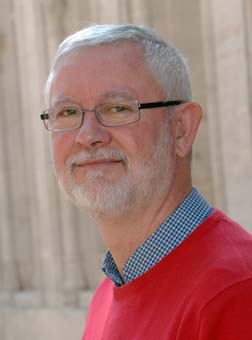
Luis R. Domingo, full university professor of Organic Chemistry at the Universitat de València, has proposed to modify the study of reactivity through his theory ‘Molecular Electron Density Theory’ (MEDT). His contribution was recently published in the ‘Molecules’ magazine and it was funded as an excellent project by the MINECO between 2017 and 2019. It aims at changing the model that has been taught in organic chemistry for more than 50 years.
The proposal suggests that reactivity (property of the substances to provoke chemical reactions) should be analysed from the changes in the electron density and not from the interactions between molecular orbitals, as it has been done for 50 years. The professor is Fellow of the British Royal Society of Chemistry since 2015, which is the highest award of this prestigious scientific society.
The electron density is the probability of knowing the location of the electros within a molecule. Domingo explains that at the end of the 20th century, quantum-mechanical methods that allow the analysis of electron density and, therefore, reactivity, were developed ‘in a rigorous way’.
Since 1925, the molecular structure has been studied through the Schrödinger equation, which is a complex model that describes the movement of electrons with a wavy movement. Given the difficulty of applying the approach of the Austrian physicist to the study of electronic density even in the simplest molecular system, in 1934 the theory of molecular orbitals (OMs) was considered as an approximation, valid for more than 80 years, and that is what Professor Domingo now refutes as a model for the study of reactivity in organic chemistry.
Luis R. Domingo, in his theory on molecular electron density rejects that the interactions between molecular orbitals, which are the basis of the frontier molecular orbital theory, can control chemical reactivity, because they do not have any physical meaning.
‘The proposal that I present will allow to reject strong theories in organic chemistry such as the Woodward–Hoffmann rules, the mechanism of the pericyclic reactions or the FMO theory, as well as the recent theory on the distortion/interaction stablished by Houk in 2007’, has said Luis R. Domingo.
The professor of the Universitat de València affirms that after 20 years and more than 250 scientific articles published in international magazines, MEDT ‘is going to change many concepts in organic chemistry’. In fact, from 1995 until today, Professor Domingo has developed an extensive theoretical work to demonstrate that the FMO theory is obsolete and mistaken.
The MEDT was established by the end of 2015, and to date seven scientific papers have been published based on it. A part of this work has been funded through several Excellence projects of the Ministry of Economy and Competitiveness. In the last call, for the period 2017-2019, it has been funded again.
The origin of MEDT was already outlined in a review published by Professor Domingo in 2014 entitled A New CC Bond Formation Model Based on the Quantum Chemical Topology of Electron Density, while at the end of 2015 he presented for the first time the theory in the article Understanding the high reactivity of carbonyl compounds towards nucleophilic carbenoid intermediates generated from carben isocyanides. Until 2016, Luis R. Domingo has published seven articles referring to MEDT.
It also stands out its contribution to the development of new chemical reactivity indices defined within the conceptual density functional theory (CDFT). This work has allowed to establish a series of indexes that explain in a simple way the reactivity of the organic molecules in polar reactions. These indexes are included in the recent review in the ‘Molecules’ journal entitled Applications of the Conceptual Density Functional Theory Indices to Organic Chemistry Reactivity.
The contribution of the professor Domingo to the theoretical organic chemistry stablishes new concepts and reactivity models that will allow to modify the current teaching in organic chemistry, which is based in models developed in the 60s of the last century.
Article:
Luis R. Domingo: Molecular Electron Density Theory: A Modern View of Reactivity in Organic Chemistry Molecules 2016, 21(10), 1319; doi: 10.3390/molecules21101319
Link: http://www.mdpi.com/1420-3049/21/10/1319
Last update: 28 de december de 2016 07:00.
News release



















